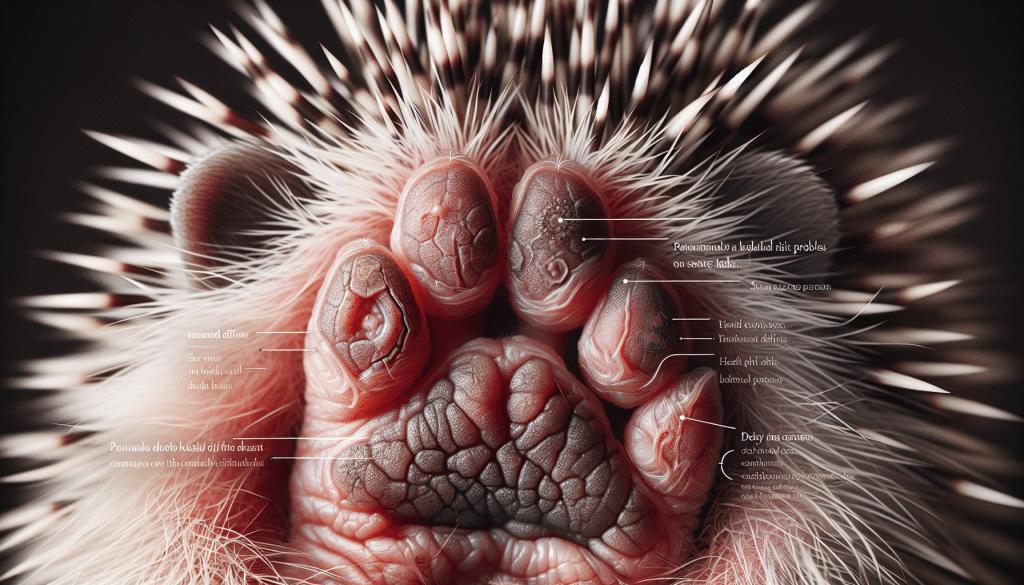Have you ever wondered about the common health concerns in hedgehogs? These adorable little creatures may seem low-maintenance, but there are certain health issues that hedgehog owners should be aware of. In this article, we will explore some of the most common health concerns that hedgehogs may face, including mites, dental problems, and obesity. By understanding these potential issues, you can provide the best possible care for your spiky pet and ensure their well-being. So, let’s dive into the world of hedgehog health concerns and learn how to keep our prickly pals happy and healthy!

Obesity
Understanding hedgehog dietary needs
As a hedgehog owner, it’s important to understand the dietary needs of your pet to prevent obesity. Hedgehogs are insectivores, which means their primary diet consists of insects, small invertebrates, and occasional fruits and vegetables. However, feeding them a high-fat diet or excessive amounts of cat food can lead to weight gain and obesity.
To provide a balanced diet for your hedgehog, opt for high-quality hedgehog food that is specially formulated to meet their nutritional needs. These foods often include a mixture of protein-rich insects or meat, vegetables, and fruits. It’s also essential to limit the intake of fatty and sugary treats.
Recognizing signs of obesity
Recognizing the signs of obesity in hedgehogs is crucial in maintaining their overall health. Some common signs of obesity include difficulty curling into a ball, excess fat around the abdomen, and waddling or dragging their hind legs while walking. Additionally, if you notice that your hedgehog is less active or has difficulty breathing, it could be an indication of obesity.
Regularly monitoring your hedgehog’s weight and maintaining a healthy diet and exercise routine can help prevent obesity and its associated health issues.
Prevention and management of weight issues
To prevent obesity in hedgehogs, it’s important to establish a healthy eating routine and portion control. Feeding measured amounts of food daily and avoiding free-feeding can help regulate their calorie intake. Additionally, incorporating regular exercise through supervised playtime or the use of a hedgehog wheel can promote weight management.
If your hedgehog is already overweight, consult with a veterinarian to develop a weight-loss plan. This might include adjusting their diet, increasing exercise, and monitoring their progress closely. Regular check-ups with a vet can also help identify any underlying health issues contributing to the weight gain and ensure appropriate management.

Dental Problems
Common dental diseases in hedgehogs
Proper dental care is essential for hedgehogs, as dental diseases can lead to pain, discomfort, and difficulty eating. Some of the most common dental issues in hedgehogs include periodontal disease, tooth decay, and overgrown teeth. These problems can occur due to a variety of reasons, including poor diet, lack of appropriate chew toys, or genetic factors.
Symptoms of dental issues
Recognizing the symptoms of dental problems can help you seek timely veterinary care for your hedgehog. Some signs to watch out for include drooling, lack of appetite, weight loss, and difficulty chewing or eating. Your hedgehog may also show signs of pain or discomfort, such as pawing at their mouth or exhibiting behavioral changes.
Treatment and prevention of dental ailments
If you suspect that your hedgehog has dental issues, it’s crucial to consult with a veterinarian experienced in exotic pet care. They will conduct a thorough dental examination and may recommend a dental cleaning under anesthesia to address any existing issues. Regular dental check-ups and professional cleanings can help prevent dental problems in the future.
In terms of prevention, providing appropriate chew toys, offering a balanced diet that promotes dental health, and practicing good oral hygiene can go a long way in maintaining your hedgehog’s dental well-being. Be mindful of the texture and size of toys to avoid any potential injuries to their teeth or mouth.

Skin Disorders
Types of skin conditions affecting hedgehogs
Hedgehogs can be prone to various skin disorders, often caused by factors such as poor hygiene, external parasites, or underlying health conditions. Some common skin conditions in hedgehogs include mites, fungal infections, and dry skin. These issues can cause discomfort, itchiness, and even lead to secondary infections if left untreated.
Identifying symptoms of skin problems
Being able to identify the symptoms of skin disorders is crucial for early detection and treatment. Look out for signs such as excessive scratching, hair loss, redness, flakiness, or the presence of open sores on your hedgehog’s skin. They may also display behavioral changes like increased irritability or lethargy due to discomfort.
Treatment options and skincare routines
If your hedgehog is experiencing a skin disorder, it’s important to consult with a veterinarian who specializes in exotic pet care. They will conduct a thorough examination and may recommend treatments such as medicated baths, topical creams, or oral medications to address the specific skin condition. Additionally, implementing a regular skincare routine, including gentle cleaning and moisturizing, can help prevent future skin problems.
Proper hygiene practices, such as regular cage cleaning and providing a clean environment, are integral in preventing skin disorders. Avoid using harsh or scented cleaning products that may irritate your hedgehog’s sensitive skin.

